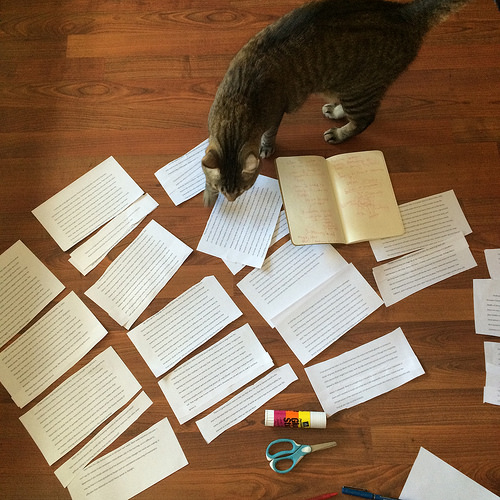
Why Columbia?
[flickr id=”13951203437″ thumbnail=”medium_800″ overlay=”true” size=”original” group=”” align=”none”] You may remember my previous two posts where I discussed why I decided to pursue graduate studies and my grad school application process. Today, I’ll discuss why I picked Columbia College Chicago.
For me, there were four main factors
Faculty
I think one of the greatest strengths of Columbia’s Nonfiction MFA program is the diversity of the faculty. The core faculty in our department, David Lazar, Jenny Boully, Sam Weller, and Aviya Kushner, all have different styles and approaches to nonfiction writing. As a student you will read a variety of texts reflecting different traditions in nonfiction ranging from the traditional personal essay to memoir to experimental and transgeneric work. Working with professors whose styles differ from your own encourages growth and experimentation. Since I started at Columbia my writing has grown thanks to the influence and guidance of my professors who have given me feedback and shown me new texts that have inspired me.
Program Length/Offerings
Columbia has a strong emphasis on understanding history and theoretical approaches to nonfiction. Knowing where it all began is essential. In your first semester you are required to take History of the Essay where you will read a variety of works ranging from the time of the Ancient Greeks to contemporary writers such as Joan Didion. I think the course is essential in getting a solid foundation of the traditions of nonfiction writing that will inform your coursework throughout your time at Columbia and your work as a writer.
Additionally, students are exposed to a variety of theoretical approaches to nonfiction in Form and Theory of Nonfiction courses. The specific focus changes every semester, but this term I am taking the course with David Lazar, who from the very beginning of the course wanted to emphasize that theoretical texts can be and are creative texts. We’ve read a variety of wonderful, insightful, challenging, and thought-provoking books this semester that have helped me intertwine theoretical approaches more within my own writing. I’m sad this class is nearly over (it will be by the time this post goes up!) but I’m also excited for my next form and theory course which is Literary Translation!
And before I forget to mention another key component of why I favored Columbia’s program is the length of the program. MFAs tend to be two years in length. Columbia’s is three, with the final year reserved to focus on writing, revising, and editing your thesis.
[flickr id=”14138121514″ thumbnail=”medium_800″ overlay=”true” size=”original” group=”” align=”none”] Location
Chicago. What’s not to love? Okay, well after that last winter that may be a difficult question to ask seriously, but Chicago is an amazing city! There’s a huge creative and literary community beyond the campus of Columbia and you can attend some sort of reading or literary event every night of the week if you wanted to/had the time. Not to mention the cost of living in Chicago typically tends to be lower than some of the other top “big city” choices (I’m looking at you, NYC and Boston!), which brings me to my next point…
Price/Funding
This may not be the same for everyone, but out of all the schools that I applied to and was accepted at, Columbia’s tuition was lower than other private institutions…for some even after offering me additional funding. Your mileage may vary depending on where you applied and what additional funding you may be offered, but for me, financially, Columbia was a no-brainer. The Graduate Merit Award helped, too.
[flickr id=”13951255038″ thumbnail=”medium_800″ overlay=”true” size=”original” group=”” align=”none”]
So here I am at Columbia College Chicago, with my first year of grad school nearly completed. I have to finish up two papers, teach two more classes with my undergrads, and then it’s no class until September. It’s been a wonderful, thrilling, sometimes terrifying, and amazing first year. I can’t wait do it again!
